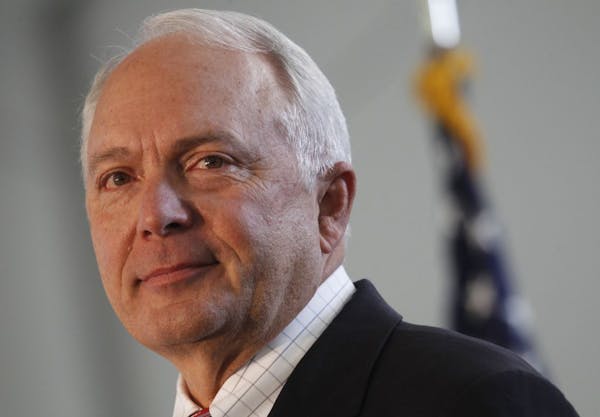Minnesota's Independence Party has a message for voters: Don't be afraid.
Leaders of the party are looking toward this year's statewide elections with the hope that the chasm between Democrats and Republicans grows, and that support for the IP's causes will, too.
Key is getting out the message to voters that there will be another option. In Minnesota, that message has worked only once: In 1998, when Jesse Ventura, the third party's gubernatorial candidate, "shocked the world" by winning 37 percent of the vote and the keys to the State Capitol along with it.
The party hasn't come close to equaling that success since.
"I'd love to say the terrain is such that there's no way we can lose," said Minnesota Independence Party Chair Mark Jenkins. "But we've got to convince Minnesotans that continuing to vote for Republicans and Democrats, no matter who the individual candidate, is continuing to vote for the dysfunction that we've had for the last 20 years."
Hannah Nicollet, a 39-year-old mother of two and ardent Ron Paul supporter, stepped forward as the Independence Party's first 2014 candidate to challenge incumbent Democrat Al Franken for U.S. Senate. She's the lone announced IP candidate thus far, but Jenkins said a prospective second candidate is waiting in the wings, while two gubernatorial hopefuls are still mulling runs.
IP candidates for the Fourth Congressional District and state auditor are likely to enter those races once their campaign websites are completed, he said. More are likely to follow before the party's May 17 convention in Mankato.
While the party and its candidates probably will continue to lack the kind of money and infrastructure needed for modern-day political campaigns, Jenkins said that can't hold him back.
"If I sat around and waited for the money to come in before I took action, there would be no Independence Party," he said.
Instead, he said, the party will focus on issues. Among them: honest budgeting, particularly as it pertains to bonding bills. Also, the IP will encourage better management of the state's transportation infrastructure.
A third issue, and a likely hot-button one as the 2014 legislative session begins: the minimum wage. In a recent straw poll of Independence Party members, half supported raising the state minimum from $6.15 to $9.50 an hour, 30 percent supported a jump to $7.50 and 20 percent chose not raising it.
The November elections could be another telling chapter in whether the IP can gain or lose traction in an ever-changing political climate. From its roots as the Reform Party during Ross Perot's presidential runs in the 1990s, the Independence Party reached its apex here when Ventura was elected. Though it hasn't fared as well since in statewide elections, it remains a force that can influence outcomes.
"I think the party always has the opportunity to make an impact depending on the caliber of the candidate, but if nothing else, what we've seen in the last three gubernatorial cycles, we were able to raise important issues," said Tom Horner, who got 12 percent of the vote as an IP candidate for governor in 2010.
"I think we were able to elevate some better political conversation around solutions, and campaigns aren't just a process to get somebody elected," he said. "They're also a process to get voters to create a mandate for solutions."
In two recent statewide elections, the Democratic and Republican candidates finished so close that recounts were required. In both cases — the 2008 U.S. Senate race, when Franken emerged as the winner, and the 2010 governor's race that put DFLer Mark Dayton in office — partisans said the IP tally made the races so close.
Dayton, like Franken, is seeking re-election this year.
Jenkins said moderate voters who initially support the IP candidate often change their minds at the last minute and vote for a Democrat or a Republican.
"They vote out of fear," said Jenkins, "but I wish I could convince Minnesotans that the thing I fear most is that you're going to elect the same people over and over again."
